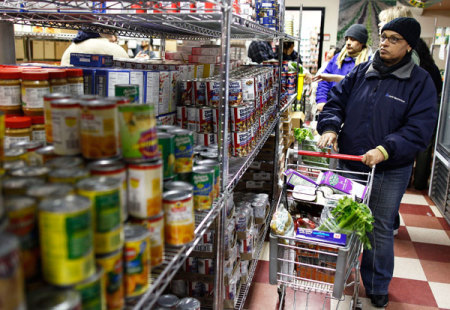14 states, NYC, DC sue Trump admin over work requirement rule that would cut 700,000 from food stamps

Calling it “arbitrary, capricious, an abuse of discretion” and contrary to law, 14 states, New York City and Washington, D.C., asked a federal court in a lawsuit Thursday to vacate a final rule that if implemented will cut off nearly 700,000 people from food stamp benefits due to the imposition of stricter requirements for able-bodied adults without dependents.
“Plaintiffs respectfully request that this Court vacate the Rule and enjoin its implementation because it is arbitrary, capricious, an abuse of discretion, and otherwise not in accordance with law under the Administrative Procedure…because the Rule was promulgated without observance of procedure required by law,” said the suit seeking to protect food stamp benefits for the at-risk group through the program formally known as the U.S. Department of Agriculture’s Supplemental Nutritional Assistance Program.
The lawsuit was joined by attorneys general of California, Connecticut, Maryland, Massachusetts, Michigan, Minnesota, Nevada, New Jersey, New York, Oregon, Pennsylvania, Rhode Island, Vermont and Virginia.
U.S. Secretary of Agriculture Sonny Perdue told reporters on a call last month that the final rule, which is expected to be fully implemented in 2021, will move more able-bodied food stamp recipients toward self-sufficiency and into employment.
“Americans are generous people who believe it is their responsibility to help their fellow citizens when they encounter a difficult stretch. Government can be a powerful force for good, but government dependency has never been the American dream. We need to encourage people by giving them a helping hand but not allowing it to become an indefinitely giving hand,” Perdue said in his remarks on the final rule, which he said was made at the direction of President Donald Trump.
Able-bodied adults between the ages of 18 and 49 without dependents are restricted under federal law to three months of benefits within a 36-month period unless they work at least 20 hours a week or participate in certain educational or job-training activities.
Current USDA regulations allow for states to waive the work requirement if the area's unemployment rate is 20 percent higher than the national rate. The new rule, which will not apply to children and their parents, those older than 50, senior citizens, those with a disability, or pregnant women, will allow states to waive the work requirement only in areas where the unemployment rate is above 7 percent.
The lawsuit argues that the new rule upends a longstanding USDA policy that gave states discretion to seek waivers from the SNAP work requirements for areas within each state that lacked sufficient jobs for benefits recipients.
“The statute and the USDA’s prior regulations recognize that States are in the best position to evaluate local economic circumstances and to determine where there are insufficient job opportunities such that work requirements would be ineffective. The new Rule eliminates State discretion and criteria regarding local economic conditions for waiving work requirements, resulting in the termination of essential food assistance for benefits recipients who live in areas with insufficient jobs,” the state and local government officials argue in the lawsuit.
The states raised several other objections to the rule, noting that it: virtually eliminates states’ ability to use data other than unemployment rates to demonstrate a lack of sufficient jobs for able-bodied adults without dependents; creates a new criterion that Congress recently rejected for receiving a waiver, namely, an unemployment threshold that is unrelated to local job opportunities for able-bodied adults without dependents; and requires states to rely on unemployment numbers for the entire population rather than on the availability of employment for ABAWDs or on other metrics that more fully capture local economic conditions.
It was further noted that the rule also unlawfully limits states’ authority to carry forward unused exemptions — a longstanding protection for states that Congress reaffirmed in 2018.
“The Rule unequivocally runs afoul of Congress’s intent to ensure food security for low-income individuals and to permit States, who have a better understanding of their labor markets and economic conditions, to apply for waivers and use exemptions where local or individual circumstances warrant relief from the ABAWD time limit,” the plaintiffs argue.





















